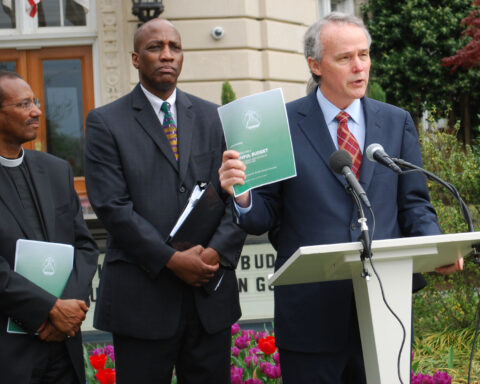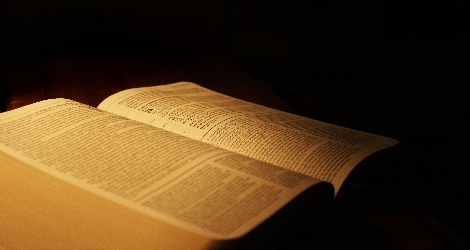[wpcol_1half id=”” class=”” style=””]
Imperial Insurgency and Prophetic Criticism: The empire strikes back?
Eventually the powers of hierarchy and centralization asserted themselves in Israel. The transition to monarchy should not simply be viewed as a fall from grace, however. In scripture itself, the assessment of the monarchy is mixed. At certain points, indeed, it is presented as a clear rejection of God and God’s reign. When it became clear that the people wished for a king, God said to Samuel, “Listen to the voice of the people in all that they say to you; for they have not rejected you, but they have rejected me from being King over them” (I Sam. 8:7). The consequences of such a move, moreover, are presented as devastating and counter to God’s intentions: oppression, exploitation, inequality, and injustice (see I Sam 8:11-18).
But the Bible does not present the monarchy as unambiguously opposed to the good of the people or the will of God. God, after all, blesses each of the kings, first Saul, then David, then Solomon and on down the line. The threat of the Philistines required a more unified response than the Tribal League could provide and the monarchy definitely produced a higher level of wealth and prosperity than Israel had previously known. Unfortunately, the prosperity and security provided by the monarchy also came at the cost of equality and independence. Therefore, one of the primary apocalyptic images for Israel was borrowed from the monarchy and offered a profound critique of it: the messiah, the “anointed one,” the true king who would rule as God intended.
Meanwhile, in the name of the covenantal heritage of Israel, the biblical prophets proclaimed God’s judgment upon the monarchy and the economic hierarchies that accompanied it. The paradigmatic struggle between the forces of the imperial monarchy and the covenantal vision of the prophets is seen in the story of Naboth’s vineyard. When Naboth refused to give his “ancestral inheritance”—nahala—to King Ahab for a palace garden, the queen, Jezebel, and Ahab conspired to have him killed on trumped up charges of blasphemy. The prophet Elijah confronted Ahab and Jezebel and announced God’s judgment against them. It was they who had blasphemed against God and betrayed God’s covenantal order.
The prophet Amos continued this prophetic tradition in the Northern Kingdom. He proclaimed God’s judgment upon Israel, because “they sell the righteous for silver, and the needy for a pair of sandals—7they who trample the head of the poor into the dust of the earth, and push the afflicted out of the way” (Am. 2:6-7). God will “tear down the winter house as well as the summer house; and the houses of ivory shall perish, and the great houses shall come to an end” (Am. 3:15). The whole imperial system of hierarchy is condemned and destined for destruction: “Therefore, because you trample on the poor and take from them levies of grain, you have built houses of hewn stone, but you shall not live in them; you have planted pleasant vineyards, but you shall not drink their wine” (Am. 5:11).
[/wpcol_1half] [wpcol_1half_end id=”” class=”” style=””]
Later Isaiah proclaimed the message to the Southern Kingdom, saying: “Woe to those who join house to house, who add field to field, until there is no room, and you are made to dwell alone in the midst of the land. The Lord of hosts has sworn in my hearing: ‘Surely many houses will be desolate, large and beautiful houses, without inhabitants’” (Is. 5:8-9). The prophets of both the Northern and Southern Kingdoms interpreted their destruction and defeat as a consequence of forgetting the covenant and its economic principles.
But the prophets also held out the promise of restoration. Jeremiah in particular sees the restoration as a recapitulation of the exodus and covenant.
The days are surely coming, says the Lord, when I will make a new covenant with the house of Israel and the house of Judah. It will not be like the covenant that I made with their ancestors when I took them by the hand to bring them out of the land of Egypt—a covenant that they broke, though I was their husband, says the Lord. But this is the covenant that I will make with the house of Israel after those days, says the Lord: I will put my law within them, and I will write it upon their hearts; and I will be their God and they shall be my people (Jeremiah 31: 31-33).
The people of Israel continued to hold out hope in the promise of God’s graciousness and the relevance of the covenantal order, despite the dominance of imperial powers and hierarchical orders in their lives, societies, and hearts. Neither Egypt nor Babylon, neither the Kings of Israel nor Judah, could convince them that God’s covenantal order had been ultimately thwarted. In the end, they were no match for the power of God’s kingdom and its covenantal order of dependence, independence, and interdependence.
[/wpcol_1half_end]





Unbound Social